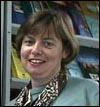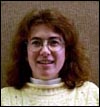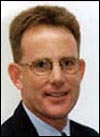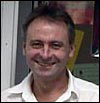Throughout the operation of the CRC for Premium Quality Wool some 70 experts contributed to the Woolwise educational resources. After the value of this material had been proven in the field and classroom, the task of organising, collating and preparing the material for downloading from this site was undertaken over two years by a team of dedicated people. When the CRC was wound up the ownership of the site and its contents was transferred to the Australian Wool Education Trust (formerly the AWTA Ltd Wool Education Trust) for continuing maintenance. The Trust acknowledges the efforts of the team that created the CRC educational resources downloadable from this site.

Helen Daily joined the Education Program of the Wool CRC as Adelaide site coordinator. This role provided day-to-day contact with students at both Waite and Roseworthy campuses as facilitator and subject coordinator of the four videoconferenced subjects. She also liaised with local presenters involved with the undergraduate lecture series. Prior to this, Helen had participated in Wool Biology and Wool Production as an Honours student within the Animal Science Department of the University of Adelaide in 1996, and also demonstrated in practicals for the Wool Technology and Metrology subject the same year.
Helen is a professional woolclasser who obtained her agriculture degree at Roseworthy before successfully competing an Honours project at Waite evaluating SRS as a selection criterion in South Australian Merino sheep. She is currently employed by the Wool CRC in a technology adoption role and by the University of New England as Decision Support specialist, incorporating the modeling program GrassGro into the UNE curriculum.

Dr Brad Crook obtained his PhD in Merino breeding and genetics from the University of NSW in 1991 and undertook a post-doctoral position with CSIRO Animal Production, Armidale, from 1991 to 1994. This project focussed on a survey of the relationships between skin traits and wool quality traits in medium Peppin Merino studs throughout NSW. From 1994 to 1999, Brad was employed at The University of New England (UNE) as part of the CRC Education Program. During this time, he was responsible for development and delivery of the Wool Production unit as well as implementing at UNE the CRC’s undergraduate units in Wool Marketing, Wool Biology and Wool Technology and Metrology. Brad has supervised 8 postgraduate (PhD and Masters) projects related to breeding and genetics for the wool sheep, meat sheep, beef cattle and alpaca industries, as well as presently supervising a Masters project in fibre curvature metrology.
Brad has supervised 10 honours projects in fibre biology, sheep breeding and consumer willingness to pay for natural fibre-based garments. In 1997 to 2000, Brad was Chief Investigator in an ARC-funded project looking at the application of microwave technology in the scouring of greasy wool and Chief Investigator (1999) in a UNE-funded project looking at the tactile properties of alpaca fibre and wool-alpaca fibre blends.
Brad was Associate Investigator in an RIRDC-funded project (1999-2002) looking at the genetics of resistance to internal parasites in fibre goats and since 1997, has been involved in the design of village breeding programs for wool sheep and angora goats in Chitral, NW Pakistan. This involved a 3-week tour throughout the villages of the Chitral region in 1998. Brad was coordinator and chairman of the CRC’s “Access to the Experts: Producing the Wool that the Market Demands” workshops in 1997, as well as editor of the workshop proceedings, and was UNE team trainer for the Australian National Merino Breeding Skills Competition, Dubbo NSW, August 1996 (1st place team; 2nd and 3rd place individual), 1998 (1st and 2nd place team; 3rd place individual) and 1999 (3rd place individual).

Dr Janelle Hocking Edwards completed her Bachelor of Agricultural Science (Honours) at the University of Adelaide in 1988. She stayed at the same university to complete her Doctor of Philosophy in 1994 studying the physiology of the skin and wool follicles of fine and strong wool Merinos under the supervision of Prof Phil Hynd. Janelle undertook a Postdoctoral position with Massey University and AgResearch Grasslands in Palmerston North, New Zealand to examine growth factors which are present in fetal sheep skin. In 1995, Janelle moved to Perth, Western Australia to take up a lectureship with the CRC for Premium Quality Wool at the University of Western Australia. In this position she coordinated the Wool Biology Units of the CRC Education Program and was responsible for the other subjects at UWA.
While at UWA, Janelle also conducted a research program examining the effect of ewe nutrition during pregnancy on skin development and lifetime wool producing ability of her lambs.

Lorraine Osborne was employed by the CRC for Premium Quality Wool education program at The University of New South Wales in the Textile Technology Department from March 1996 to the conclusion of the CRC. During this time, she assisted Dr Peter Auer in the coordination and video conference presentation of two wool science subjects, Wool Metrology & Technology and Wool Marketing. More recently she has been heavily involved in the development and organisation of the Woolwise CRC wool education database and web site. Prior to 1996 Lorraine worked for eight years at the CSIRO Division of Wool Technology, Sydney in the Fibre Specification Group. During these years the main emphasis of Lorraine’s work involved assisting Dr Trevor Mahar in the research programs, ‘Carding Wool Specification’, The Prediction of Processing Performance of Carding Wools’ and ‘Processing Prediction of Sale Lots’.

Dr. Peter Auer was awarded a PhD.from the University of New South Wales (UNSW) in 1993 after studying aspects of the accelerated interaction of light with artificially whitened wool fibre. He then undertook consecutive post-doctoral research positions studying the formation and consequences of mould growth on cotton fibre, and the source and consequences of fibre / pin interaction during wool fibre processing. Further studies have included a Graduate Certificate in Higher Education encompassing current pedagogy emphasizing learner development. From 1994 to 1999, Peter was employed at UNSW as a member of the CRC for Premium Quality Wool (Wool CRC) Education Program. He was responsible for the curriculum development of subjects and subject components such as Wool Marketing, Wool Technology, Wool Metrology, Fibre Science, Wet & Dry Finishing, Later Stage Processing of Wool and Computer Studies. Peter was also responsible for the implementation of Wool Production and Wool Biology at UNSW.
Along with members of the Wool CRC Education Program, Peter developed benchmark methods and techniques for the delivery of lectures by videoconference. These were conducted across Universities in three States (NSW, SA and WA) from 1995 to 1999. Peter personally conducted around 250 such lectures in this period. The Year 3 Review of the Wool CRC highlighted the achievements of the Education Program in developing and delivering this national, interactive, undergraduate education program.
Peter was involved in the Wool CRC’s China Project (funded by AusAid) that established a viable post-graduate wool research program between Australian wool institutions (UNSW, then IWS and CSIRO Textile and Fibre Technology), and some of P.R. China’s leading textile universities. Peter also supervised a number of Honours projects studying wool metrology (wool fibre density and fibre curvature) and basis risk management in the wool industry.
Peter was the coordinator and Chairman of the Wool CRC’s “Access to the Experts: Marketing the Wool that Consumers Demand” presented in 1997. This was a national (NSW, SA, WA, Vic., Tas.) videoconference workshop involving a wide cross-section of the wool value chain education sector focusing on the discussion of issues and technology transfer. Peter was also the technical coordinator of “Access to the Experts: Producing the Wool that the Market Demands” presented in 1997.
As a member of the Wool CRC Education Program, Peter was involved in the conceptualization and development of a multi-level Web-based resource based on the materials developed during the Wool CRC’s Wool Science and Wool Marketing undergraduate teaching program. The Wool CRC will publish this resource, targeted at wool educators, in 2000.

Professor Phil Hynd is the Head of the Department of Animal Science at The University of Adelaide, located on the Roseworthy Campus north of Adelaide. His research has focussed on the functioning of wool and hair follicles, and in particular the cellular events resulting in the growth of fibres (length versus diameter). By combining genetically-defined animals with specific nutritional manipulations he has been able to dissect the seminal events resulting in differential fibre growth. More recently he has been using molecular approaches to isolate and characterise amino acid transport genes operating in the follicle, and is using these findings to investigate sheep differing genetically in fleece traits. Professor Hynd is also actively involved in the Sheep CRC developing improved techniques for mulesing sheep.
![]()
The Woolwise team also acknowledges the Australian Wool Testing Authority Ltd and the Australian Wool Education Trust (formerly the AWTA Ltd Wool Education Trust) for their generous support of the Woolwise project.